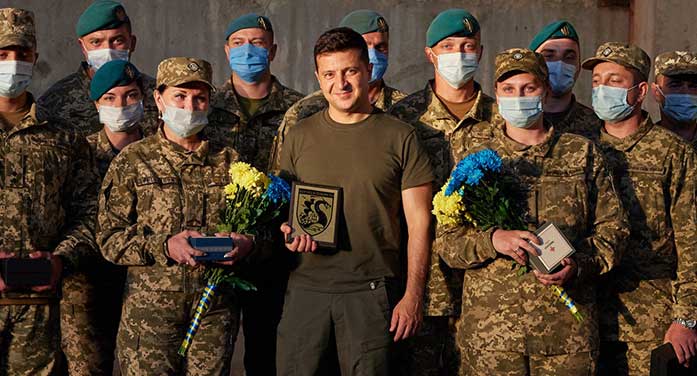 During times of war and conflict, many memorable lines have been delivered by political and military leaders.
During times of war and conflict, many memorable lines have been delivered by political and military leaders.
A few notable examples include:
- Pericles’s appeal for war against Sparta, 432 BC: “We must live up to the standard they set: we must resist our enemies in any and every way, and try to leave to those who come after us an Athens that is as great as ever.”
- Queen Elizabeth I’s support of her military against the Spanish Armada, July 1588: “I am amongst you at this time, not as for my recreation or sport, but being resolved, in the midst and heat of the battle, to live or die amongst you all; to lay down, for my God, and for my kingdom, and for my people, my honour and my blood.”
- U.S. President Abraham Lincoln’s Nov. 19, 1863, Gettysburg Address: “Four score and seven years ago our fathers brought forth, on this continent, a new nation, conceived in liberty, and dedicated to the proposition that all men are created equal.”
- British Prime Minister Sir Winston Churchill’s June 4, 1940, speech to the House of Commons: “We shall fight on the beaches, we shall fight on the landing grounds, we shall fight in the fields and in the streets, we shall fight in the hills; we shall never surrender.”
- General Dwight D. Eisenhower launching the Battle of Normandy on June 6, 1944: “In company with our brave Allies and brothers-in-arms on other fronts, you will bring about the destruction of the German war machine, the eliminations of Nazi tyranny over oppressed people of Europe, and the security for ourselves in a free world.”
The newest addition to the list occurred during Russia’s invasion of Ukraine. It’s one of the shortest and one of the most memorable.
On Feb. 26, the United States offered to help evacuate Ukrainian President Volodymyr Zelenskyy and others from the capital city of Kyiv. According to Ukraine’s Embassy to the UK Twitter account, Zelenskyy’s response was reportedly conveyed to the Americans in the following fashion: “The fight is here; I need ammunition, not a ride.”
What a brilliant and powerful line. It perfectly encapsulated Ukraine’s fighting spirit. We’ve seen it in the form of average citizens, including grandparents and young people, taking up arms to defend their country at all costs.
Equally inspiring was a 40-second video that Zelenskyy put out to dispel several rumours that he had departed Ukraine. “Do not believe the fakes,” he said in a translated version, “I am here. We are not putting down arms. We will be defending our country, because our weapon is truth, and our truth is that this is our land, our country, our children, and we will defend all of this. That is it. That’s all I wanted to tell you. Glory to Ukraine.”
Who would ever have believed Zelenskyy – a 44-year-old anti-populist, anti-establishment politician with a law degree who worked for years as an actor and comedian – would suddenly transform into a national hero?
That’s exactly what has happened.
This is also a fine example of Thomas Carlyle’s great man theory. It was first introduced during a series of lectures on heroism the Scottish philosopher gave in 1840 and published in On Heroes, Hero-Worship, and The Heroic in History a year later.
“Universal History, the history of what man has accomplished in this world,” Carlyle said, “is at bottom the History of the Great Men who have worked here. They were the leaders of men, these great ones; the modellers, patterns, and in a wide sense creators, of whatsoever the general mass of men contrived to do or to attain; all things that we see standing accomplished in the world are properly the outer material result, the practical realization and embodiment, of Thoughts that dwelt in the Great Men sent into the world: the soul of the whole world’s history, it may justly be considered, were the history of these.”
Whether or not you subscribe to the great man theory, it does seem that tumultuous periods of human history often give rise to great men and women. This includes individuals you would expect to take command, as well as individuals who rise to the challenge to take up the mantle with confidence and proper execution.
Zelenskyy seems to be a good fit in the latter category.
His ability to stay positive and focused in the midst of Russia’s invasion of his country is nothing short of remarkable. His refusal to give an inch to Russian President Vladimir Putin’s grotesque demands, and the latter’s terrifying dream of rebuilding the old Soviet Union piece by piece, is admirable.
It helps explain why Ukrainians have held their own against the enormous Russian army. They’ve made Putin blink several times. They took back the country’s second-largest city, Kharkiv, and kept them at bay in Kyiv. They’ve gained the support of many Western democracies.
It could also lead to a ceasefire between these two countries in the coming days. That would be a huge victory for Zelenskyy’s Ukraine and a massive defeat for Putin’s Russia.
The power of words, indeed.
Michael Taube, a Troy Media syndicated columnist and Washington Times contributor, was a speechwriter for former prime minister Stephen Harper. He holds a master’s degree in comparative politics from the London School of Economics. For interview requests, click here.
The opinions expressed by our columnists and contributors are theirs alone and do not inherently or expressly reflect the views of our publication.
© Troy Media
Troy Media is an editorial content provider to media outlets and its own hosted community news outlets across Canada.

